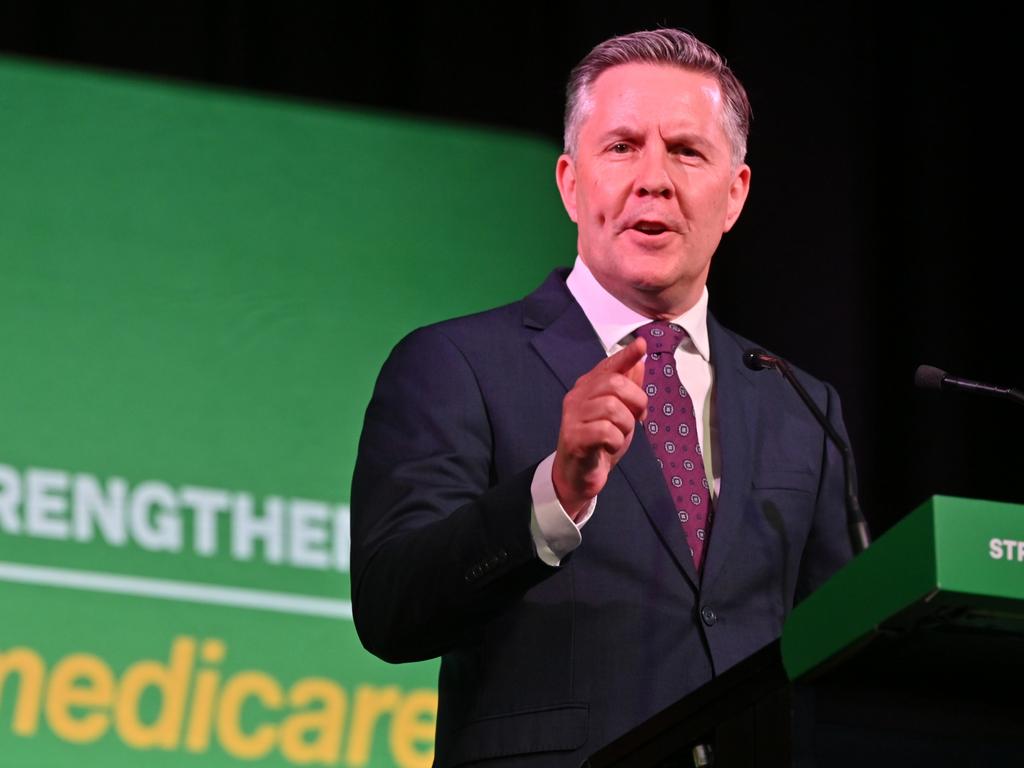Patient interests ‘not put first’ in hospital-insurer feud, government warns
Mark Butler has made a rare federal intervention in the increasingly bitter feud between private hospitals and health insurers, calling for increased income from premium rises to be passed on to service providers.

The Albanese government has threatened regulatory action against health insurers if they fail to fork out more to struggling private hospitals, wading into a bitter feud between funds and service providers ahead of the April 1 premium rise.
On Tuesday, Health Minister Mark Butler placed a request through his departmental secretary for the Private Health CEO Forum to take action on payments to private hospitals within the next three months, directing they increase funding to a greater portion of their benefits.
“The private hospital sector is facing a number of challenges that can only be managed by hospitals and insurers sitting down together and sorting it out,” he said. “For more than 12 months, the government has made it clear that we expect them to do so but they have not put the interest of patients first.
“I’ve asked the CEO Forum to take immediate action to increase payments to hospitals to ensure patients are able to access important services.
“If there aren’t sufficient actions taken within the next three months, I’ve asked for advice on regulatory actions that I can take to ensure patients can access the care they need.”

The Health Department will open discussions with each of the major funds ahead of the forum on March 7, instructing them to improve their hospital funding by June or else face potential consequences from the Australian Prudential Regulation Authority or Australian Competition and Consumer Commission.
According to APRA the portion of benefits invested into hospitals had fallen from a long-term average of 90 per cent to 85.5 per cent by the financial year 2023-24.
Of the big four insurers, Bupa contributed the least at 83.8 per cent in that year, compared to HCF at 91.8 per cent. Medibank gave 85.8 per cent and NIB gave 84.1 per cent.
“People put their hard-earned money into private health insurance, and they are frustrated that they are getting less services for it,” Mr Butler said.
On April 1, the private health insurance premiums of the almost 15 million Australians with coverage will rise an average 3.73 per cent.
Australian Private Hospitals Association chief executive Brett Heffernan previously told The Australian the premium increase would deliver a $2.2bn “windfall” for the insurance industry, but worried hospitals were unlikely to see that profit passed on.
“When the federal Health Minister approves premium hikes each year the federal government cannot abrogate responsibility for how those funds are, ultimately, spent, siphoned or squirrelled away by insurers,” Mr Heffernan said.
“The last thing Australia’s health system needs is more private hospital services sacrificed due to insurance company greed and government indifference.”
The decision comes after months of negotiations between insurers and the government, during which Mr Butler twice rejected proposed premium increases of up to 6 per cent.
Almost 20 private hospitals have closed their doors since 2022, while more than 70 services in other private hospitals have ceased to be offered.
Among the cohort, Australia’s second largest for-profit private hospital operator, Healthscope, is sitting closest to the brink.
It was bought by Canadian private equity giant Brookfield for $4.4bn five years ago, but has begun closing wards and shutting services since. On Tuesday, HealthCo Healthcare & Wellness REIT announced Healthscope had not paid rent on 11 facilities it owned, threatening eviction.
HCW told shareholders it had issued breach notices to Healthscope for failing to pay all rent due for March, noting that part payment had been received.
Private Healthcare Australia chief executive Rachel David said funds would be willing to speak with the Department, but said any permanent intervention to mandate greater contributions would drive up pressure on premiums.
“There is a very delicate balance that we need to walk here,” Dr David said.
“Health funds will continue to engage in constructive discussion about possible short-term actions to assist hospitals in trouble via the CEO Forum. However, we will not agree to any measures that risk driving up the cost of health insurance for 15 million Australians investing in it during a cost-of-living crisis.
“Australians with health insurance should not be asked to bailout private businesses that have been mismanaged or are delivering inadequate services.
“It would bring it to question whether private health insurance was really a private market, and it would really put the responsibility for those premium increases solely on the shoulders of the Health Minister.”





To join the conversation, please log in. Don't have an account? Register
Join the conversation, you are commenting as Logout